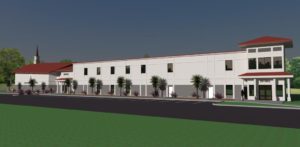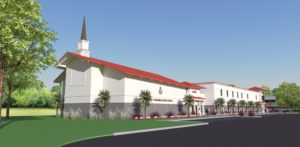
OPENING DOORS FOR WOMEN AT THE ADULT REHABILITATION CENTER
AN IN-DEPTH LOOK
“I thought I was going to another jail.”
Tasked with opening the second Adult Rehabilitation Center for women in The Salvation Army’s Southern Territory, Director of Special Services Major Katherine Hodder-Reed (Major Reed) returns to these words often.
Spoken by a surprised and relieved woman, who had just entered the ARC in Anaheim, CA, the words revealed her fears. They also reflected and reinforced Major Reed’s mission to ensure everything about the program overcomes fear with love that heals.
Today in Tampa, Major Reed believes the first impression of a clean, nice and homey center is one of the first opportunities to communicate care.
Research and experience indicate that a warm, relational and supportive environment is critical for women to succeed in recovery*. Biology and culture make women’s experience of addiction and their needs in rehabilitation different than those of men, according to research and practitioner experience**.
As the Tampa Adult Rehabilitation Center (ARC) prepares to open its doors to women beneficiaries for the first time by the end of 2018, Major Reed is making preparations ensuring that staff are prepared to welcome up to 30 women with awareness of gender-related differences. The staff can expect to see and respond to more eating disorders, anxiety, depression, trauma, self-esteem issues, experience in commercial sex exploitation, compound abuse, and codependency.
(Gender-related differences in addiction occur along a spectrum**. Strong programs incorporate awareness of common differences into their work, but do not stereotype participants.)
“No matter how old or how young the women are, from 21 to 65, we want them to come to be able to heal and be transformed in a safe environment”, Major Reed said.
Specific Challenges
For many women, the main challenge to getting help is deciding to get help. Following through and getting help is a secondary challenge.
“A lot of times, their families don’t want them to go into rehab. They are worried about child care or want to keep the addiction private,” Major Reed said. “There are a lot of different codependency issues, including when a woman has a sober spouse.”
“Some women are concerned that they will lose relationships with their children or even their custody while they are in care. Going to be with their children is the most common reason women give for leaving [residential] rehab early. In general, women seem to ‘white-knuckle’ it rather than seek help for addiction. Men seem to go for help sooner and more willingly,” according to Tim McGuirk, a board member for Easy Does It, which provides transitional housing and supportive services for men and women in early recovery who would otherwise be homeless.
Women who have children at home often experience “guilt and shame. They feel like bad mothers for leaving to seek help,” Major Reed said.
Awareness of the pressures women face while in rehab is critical. Staff, volunteers and sponsors can help women recognize the value of the work they’re doing while in the program and how it will help them and their children in the long run.
Even though women have been more resistant to enter long-term residential programs, the number of women willing to enter treatment has increased due to a deepening national addiction crisis and rising rates of mandated treatment for women, whose drug-related arrests have gone up.
The success among women who do enter programs has been equivalent to that of men*, so programs that remove or sensitively recognize barriers while coaching participants to overcome them can make a huge difference.
Women’s Rehabilitation Program Plan
The Tampa ARC long-term residential program is designed to take no less than six months. Participants may opt to remain in the program for an additional six months to continue progress in their recovery while in a safe environment.
The women’s program will involve individual and group counseling, work therapy, and education. Teaching about family, grief and loss, trauma, body image, and parenting skills are planned. Individual educational goals will also receive attention. The ARC has a GED class, which is available to those who do not have a high school diploma. Participants can potentially graduate the ARC with their GEDs in hand.
The ARC’s holistic approach to care is made possible through community participation.
“We work with so many wonderful agencies in Tampa, who help with medical, eye and dental care. There are resources to help with driver’s licenses and education needs,” said Major Reed. “Hillsborough County is extremely generous and willing to help the indigent. We are so grateful to work together. I know it will be a great, well-rounded program for the women.”
Female Path to Addiction
A well-rounded program that deals with more than addiction is, possibly, even more essential for women than men as it often other life problems that lead to substance use – and abuse.
Men struggling with addiction typically began using alcohol and other drugs for excitement and social bonding as teens. Repeated use increases both their tolerance level and compulsion to use more, which leads to higher levels of drug use and more life problems as a result.
Women struggling with addiction typically already experienced significant abuse, trauma and stressors when they begin using alcohol and other drugs with a romantic partner or close friends, generally in their teen years. They tend to start with higher doses and develop compulsive use much faster than men.
Both men and women can certainly begin use in other ways. However, researchers suggest that these patterns involve more than socialized gender roles. Jill B. Becker, Adam N. Perry and Christel Westenbroek provide a fascinating review of animal studies that demonstrate how drug use affects the male and female brain differently and the role of hormonal differences in the process HERE.
Support
Some rehabilitation programs will spend a great deal of time working to break down denial. Research indicates that this approach will backfire for women. Rather than being broken down and built back up, women tend to start from a “broken down” place and spiral downward in such an environment. A supportive environment, a collaborative approach, individual counseling and multi-dimensional treatment are recommended by researchers*.
“Women will receive all their individual counseling from women counselors”, Major Reed said. Research indicates that women who receive counseling for addictions or any other issue overwhelmingly prefer a female counselor, when they have a gender preference*.
The physical space is also designed to be supportive. Rather than barrack style, open rooms, three women will share a room together. “They’re not iron beds, but comfortable beds,” Major Reed said. “When things are nice, their defenses come down as they enter the place, so they can start their healing.”
Instead of a large, locker room style wash facility, there will be five smaller, shared bathrooms with two toilets, two showers and sinks for up to six women to share.
The women will also start their day together with breakfast in the women’s dormitory dining room. During work therapy, women tend to stay together and work in groups, whereas men generally brand out and work individually. A boundary system of color-coded aprons will be used to ensure that people are working in their assigned zones. Boundaries and opportunities to work in groups provides support and structure. Later in the day, the women will be able to relax in their own great room, gym and library.
Major Reed is working to develop relationships with Christian women in recovery who can serve as mentors to beneficiaries. She is also hoping that the Tampa Area women’s auxiliary board and corps women’s ministries will develop to provide additional support and social connection.
Codependency
Fostering good social support is a key way to build up foundational pillars for recovery. Relationships that help beneficiaries to continue to grow in their recovery are more than supportive, they are also an antidote to codependency, which Major Reed finds even more common among women struggling with addiction.
“Many of the men in our program have ‘burned their bridges’, but women typically still have relationships that can benefit from groups like Al-Anon, education about codependency and family counseling.”
Providing family support is always important, for both men and women, but how the ARC organizes this work depends on what is working in a specific center at the time. Recently, the Tampa ARC closed out an Al-Anon group, but Major Reed states that generally, “the 12-step programs like AA, Al-Anon, NA all work together so beautifully to take care of the family situation. We may open a new Al-Anon group when the women’s program opens.”
Critical Services for Change
The focus on expanding ARC services to women reflects The Salvation Army’s commitment to respond where there is great need and limited options. Access to rehabilitation services – at an affordable price, is sorely lacking for women in the US. The Salvation Army’s rehabilitation centers are unique because there is no payment fee for participation.
“We get calls every day asking if we take women,” says Major Kathy Reed, Director of Special Services of The Salvation Army ARC in Tampa.
Long-term residential rehabilitation programs offer beneficiaries a respite from coping with all of life’s demands while learning to be sober. An environment that heals hurts and gives structure helps beneficiaries learn how to live in a new way. The changes lead to rediscovering or finding out for the first time about some of the simplest, day-to-day pleasures.
“We were decorating a Christmas tree and one of the men asked to help. After he had picked up a bulb, he paused, and then said shyly ‘I forget how to put the bulb on the tree.’ I showed him and he did great after that,” Major Reed recalled. “Little things we take for granted like that and knowing how to have fun sober, they can all be taught by experiencing them together. We make a tradition of monthly birthday events, but also just having ‘crazy, goofy’ fun. They are all part of seeing transformation take place. That’s what it’s all about
“It is a real rewarding experience to see families be able to come back together. Most women have lost children to family members or the courts, a lot have had abortions; but, just like with men, seeing women transform, seeing them start taking care of themselves, accepting the Lord into their lives and their daily decision making…….there is no place I would rather be to witness these miracles!”
Gathering together in transformative worship will take place in a new chapel, with seating for 250. Celebrate recovery, Sunday worship, Bible studies, and many other worship opportunities will allow for the healing and a new life for a positive and godly change.
ADDICTION CRISIS AND AFFORDABILITY GAP: THE REHAB CHALLENGE
Why is it so hard to find residential treatment for women?
The main drivers of desperation in finding affordable treatment for women seem to be a) the deadly scope of a national addiction crisis and b) the cost to individuals seeking treatment. Plus, existing programs tend to be smaller for women, who are less likely than men to seek long-term residential treatment.
ADDICTION CRISIS
The scope of addiction’s devastation nationally right now is hard to overstate:
2016 American Deaths
- 64,000 by drug overdose*
- 37,461 in auto accidents**
- 17,250 from murder ***
*This is more than 2x the overdoses in 2006 – Center for Disease Control
** US National Highway & Safety Traffic Administration
*** Federal Bureau of Investigations
AFFORDABILITY CRISIS
SAMHSA’s database shows that of the 2,233 LRARCs in the US:
- 42.6% accept Medicaid
- 16.4% accept Medicare
- 30.5% offer sliding scale fees
- 31.1% offer payment assistance
NOTE: The US has 2,233 long-term residential adult rehabilitation centers (LRARC) registered with the Substance Abuse and Mental Health Administration (SAMHSA). Of these, 70% are available to women and 76% to men. Existing programs for women tend to be smaller than those for men, reflecting both understandings of best practice and challenges attracting women to such programs.
ARTICLE SOURCES
* Substance Abuse Treatment: Addressing the Specific Needs of Women A Treatment Improvement Protocol (2009), published by the U.S. DEPARTMENT OF HEALTH AND HUMAN SERVICES, Public Health Service, Substance Abuse and Mental Health Services Administration, Center for Substance Abuse Treatment – https://www.ncbi.nlm.nih.gov/books/NBK83252/pdf/Bookshelf_NBK83252.pdf
**Becker, Jill B, Adam N. Perrty & Christel Westenbroek (2012). “Sex Differences in the Neural Mechanisms Mediating Addiction: A New Synthesis and Hypothesis” in Biology of Sex Differences. https://bsd.biomedcentral.com/articles/10.1186/2042-6410-3-14




